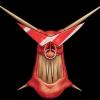Salutation all!
I started an umpteenth game project and with the experience I got from the years of trying and failure it is going smoothly in term of development and the 3D artist I'm working with is also progressing.
In short, this game is a somewhat comptemplative 2d side-scroller city builder with an emphasis on the villagers. The main gameplay loop being: villager skills unlock new building to build, new building allow villagers to learn new skills, that will unlock new building, etc…
We have a well defined scope of feature for a prototype, and I'm managing so far to do pretty modular stuff so it's easier to add content later. We are probably halfway to a functional prototype, but with barely any art and sound.
But I'm now wondering when should I start thinking about world building. Of course I have a vague idea and concept for the 3D artist to be able to start working on some model, and we did some reference research. But, since we want to go with something other than the classic fantasy (dwarves, human, elves, etc..) I though of starting as soon as possible on designing the entire world. It could help us figure out the design of the characters and building and also help us design the game experience as a whole.
I was curious to know how other approach this subject. Do you start with worldbuilding? Implement mechanics then worldbuild around? Use placeholder then adapt your mechanics?
Thanks for reading!











